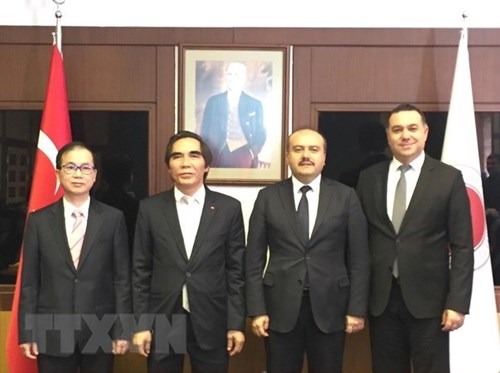Özlü made the suggestion during a recent meeting with Vietnamese Deputy Minister of Planning and Investment Nguyen Van Trung and deputy head of the National Assembly's Law Committee Hoang Thanh Tung, who were on a working visit to Turkey to learn about building free economic zones and concentrated industrial parks (IPs).
    |
 |
|
Vietnamese and Turkish officials in a joint photo |
The Turkish official spent time introducing his Vietnamese guests to Turkey’s mechanisms for managing more than 300 concentrated IPs, coordination among the state, localities and enterprises in the work, and preferential policies for domestic and foreign firms to invest in IPs.
He said he joined Turkish Prime Minister Binali Yilidirim’s official visit to Vietnam in 2017 and met with Turkish investors operating in the country. He hoped Turkish firms will soon open IPs in Vietnam in the future.
In his meeting with the Vietnamese delegation, Turkish Deputy Minister of Economy Fatih Metin said his country welcomes Vietnamese firms to invest in 18 free economic zones in Turkey.
He also called on the Vietnamese Government to continue supporting Turkish investors’ in Vietnam.
For their part, the Vietnamese officials affirmed the experience shared by the hosts would help Vietnam finalize the draft Law on Special Administrative-Economic Units.
The Vietnamese delegation also had a meeting with representatives from the Vietnamese Embassy in Turkey, during which they were updated on the development of bilateral relations and the embassy’s efforts to promote trade ties with Turkey.
Ambassador Pham Anh Tuan affirmed the agency is doing its utmost to foster ties between the two countries’ enterprises, hoping that it will receive support from ministries and sectors in the homeland in the work.
Turkey, Vietnam’s leading trade partner in the Middle East, is a gateway for Vietnamese products, including rice, tea, garment, footwear and electronics, to the Middle East market.
Two-way trade stood at nearly USD 2 billion in 2016 and the two countries have agreed to work together to raise two-way trade to USD 4 billion in 2020 through the strengthening of trade and investment cooperation.
Source: VNA